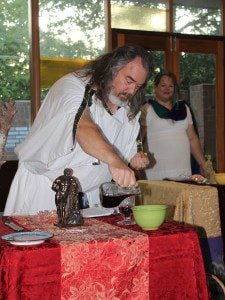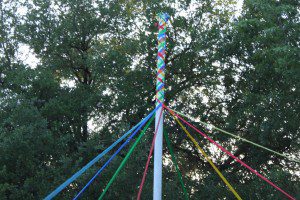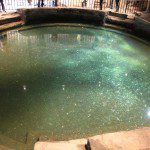 Sometimes I write because I have something I need to say. Sometimes I write because the Gods have something they want me to say. But other times I write because people have asked questions and I do my best to answer them. This piece falls into the last category.
Sometimes I write because I have something I need to say. Sometimes I write because the Gods have something they want me to say. But other times I write because people have asked questions and I do my best to answer them. This piece falls into the last category.
It’s a little ironic – while I’ve had quite a spiritual journey throughout my life, “nonreligious” has never been a term anyone would apply to me. Even in my most skeptical days, something deep inside always whispered “there’s more.” But I’ve always done my best to be honest and objective, and to understand the difference between knowing and believing.
What do I mean when I say “nonreligious”? Perhaps you grew up in a family that followed no religion, or that paid only lip service to the outer forms of mainstream religion. Perhaps you’ve been harmed by toxic religion in one form or another and want no part of it. Perhaps you simply can’t believe what some religious people say you have to believe. Perhaps you’re disgusted by the hatred and violence done in the name of religion (so are the vast majority of Pagans).
Despite all that, something brought you here, to this website and this blog post. Maybe someone you love is Pagan, and you want to understand why this is so important to them. Maybe something deeper calls to you. Maybe you’re just curious. Why doesn’t matter – you’re here, so read on.
There are many forms of Paganism. Attempts to define Paganism usually succeed only in starting arguments. However, when you look at what Pagans do and what we value, there are four centers that we gather around: Nature, the Gods, the Self, and Community. Most of us are part of multiple centers – I’m primarily a Nature and Deity centered Pagan, but I also have Self and Community centered elements in my practice.
I’m a polytheist – I have experienced many Gods, so I order my life around many Gods, even though I can never be completely sure I’m right. Other Pagans are pantheists, who find God or Goddess everywhere. Some Pagans are non-theists – they find value in Pagan practices and in the natural world, but they aren’t convinced that Gods exist.
There are far more Pagan traditions than we have room to cover in this brief introduction: Wicca, Druidry, Heathenism and the various ethnic re-creations, ceremonial magic… the list goes on and on and on. Paganism is at least as diverse as Christianity and what is true of one group may not be true of another.
 We can be passionate about our beliefs and practices. One of the purposes of religion – any religion – is to connect to something bigger than yourself. Connecting with the Gods, with our ancestors, with Nature and the spirits of Nature, or just with each other is a powerful experience. It motivates us to think about how we live and to order our lives so as to live in greater harmony with those around us.
We can be passionate about our beliefs and practices. One of the purposes of religion – any religion – is to connect to something bigger than yourself. Connecting with the Gods, with our ancestors, with Nature and the spirits of Nature, or just with each other is a powerful experience. It motivates us to think about how we live and to order our lives so as to live in greater harmony with those around us.
It may cause us to take on religious obligations that strike you as unnecessary or eccentric. Know that there is a reason behind them, even if that reason is only to strengthen the connections between ourselves and the others within our tradition, whether those others live in this world or in an Otherworld.
We have no mission to convert you. We’ve found something good and we’d be happy to share it with you if you’re interested, but unlike some religions, we don’t think our way is the only way, even if it is the only way for us. We don’t get “Goddess points” for converts, and we recognize that the Gods call who They call. If you’re happy being nonreligious that’s fine with us.
We don’t care what you believe. We care what you do. The modern, Western, Protestant-influenced world puts far too much emphasis on religious belief. For most people in most of the world throughout most of history, religion has been about who you are and what you do. While some beliefs are more likely to be true than others, fighting over unprovable propositions seems pointless.
Beliefs are important in how they cause you to live your life. In particular, we care greatly how you treat other people and the natural world. It doesn’t matter if you care for the Earth because you believe it’s the body of the Great Mother Goddess or because you believe the Earth is a living being or because you believe it’s the only planet we’ve got so we’d better take care of it. What matters is that you care for the Earth.
 We’re happy to have you participate in most of our events. You don’t have to be a Pagan to dance around the Maypole or sing a hymn to Nature. If you pour an offering to a God, we don’t care if you see that God as a real being or an aspect of a Divine force or as a metaphor for Their values and virtues. We value doing the right things, not thinking the right things.
We’re happy to have you participate in most of our events. You don’t have to be a Pagan to dance around the Maypole or sing a hymn to Nature. If you pour an offering to a God, we don’t care if you see that God as a real being or an aspect of a Divine force or as a metaphor for Their values and virtues. We value doing the right things, not thinking the right things.
But some of our activities are closed. While Paganism as we practice it is a modern thing, we draw on the heritage of our ancient ancestors, including the heritage of the mystery traditions. These are restricted to those who have experienced them before or who are experiencing them for the first time. This is to preserve the mysteries for those who will come afterwards, and to keep them from being profaned (i.e. – trivialized) by someone who has heard the words but has not experienced them and thus cannot understand their deeper meanings.
If you’re curious, ask. Most Pagans feel a strong urge to not proselytize – we aren’t likely to preach to you. And although the state of religious tolerance is far better than it was 15 or 20 years ago, we still encounter prejudice and bigotry – we’re likely to keep our religion to ourselves unless we know and trust you. But if you’re curious, ask. None of us are experts on all forms of Paganism, but we can tell you what we do and why it’s important to us. If we don’t know something we can point you toward books and websites that will help.
If the Gods call to you we hope you’ll answer Them. If They don’t, then we hope you’ll respect us as we attempt to live our lives in the way we’re called to live them.

















